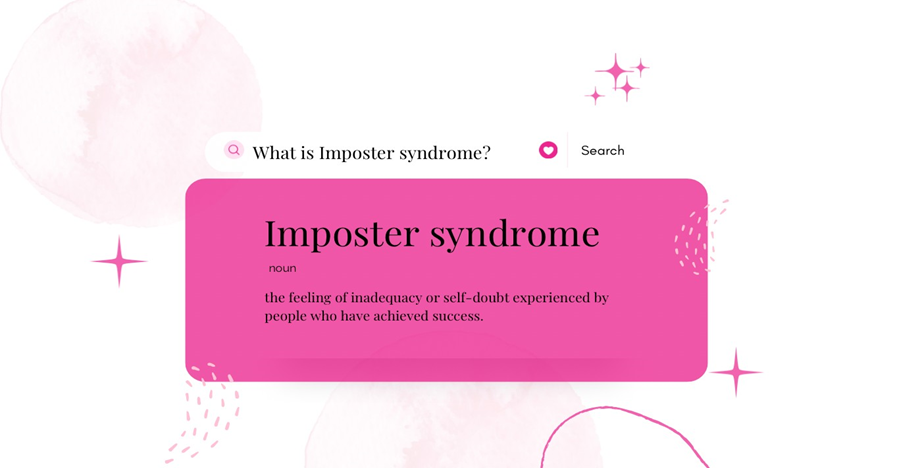Moyin: Girl! I heard you got the promotion! I am so happy for you. You worked so hard to get here and you deserve it.
Ada: Thank you, babes! However, I don’t think I deserved it. I know I worked hard but I don’t think I did enough to deserve the promotion.
If you are like Ada, sit tight and shut off any form of distraction. This article is for you! Shall we?

If you have ever felt that sinking feeling of “I am not good enough”, “I don’t deserve this”, or “I am faking it” after you achieved a great feat or accomplished something, then take a seat because you are not alone. It happens to even the most successful people you know. It is called Imposter Syndrome. Imposter Syndrome is that pesky feeling that you’re a fraud, even when you’re killing it. Imposter syndrome isn’t just about feeling insecure; it’s that persistent, nagging feeling that despite all your hard work, accomplishments, and accolades, you somehow don’t deserve your success. It can come in various forms— a sneaky voice that whispers in your head “You are not worthy”, patiently waiting for something to flop or go wrong after completing a task or achieving a goal, questioning your worth at work, doubting your talents in your personal life, or feeling like you’re not measuring up to some impossible standard. However, here are fun facts you should know:
- You are more than enough!
- You are deserving of every good thing you have now!
- You are worthy of success.
- Nothing will go wrong or flop because you did great!
Women, especially, face several societal pressures that can increase the chances of Imposter Syndrome. Add the fact that we are socialized to downplay our achievements and apologize for our successes then you have a full recipe for Imposter Syndrome. There are several reasons why people suffer from Imposter Syndrome;
- The fear of failure, making mistakes and being judged for these mistakes.
- Constantly setting high expectations for yourself and comparing yourself to other people. It is easy to get immersed in social media and compare your achievements with those of other women while forgetting that they may also have internal struggles.
- Perfectionism: The need for everything to be perfect and without a single flaw which only leads to self-doubt, stress, and anxiety.

RECOGNIZING IMPOSTER SYNDROME
To tackle the illness of Imposter Syndrome, it is important to assess the “symptoms” first”. What then are the signs of Imposter Syndrome?
- Constantly comparing yourself with other women or other people generally.
- Feeling a need to overcompensate for what you feel is an inevitable “failure”. You may find yourself working harder than necessary to avoid being discovered as a fraud.
- Downplaying your role and attributing it to external factors, like timing or help from others. You find it hard to accept that your hard work and abilities played a role.
- Doubting yourself despite evidence of success. You think to yourself “I just got lucky” when you get a compliment from a friend or a colleague at work.
- Fear of being “found out”. You feel you’re one mistake away from someone discovering that you’re not as qualified as they think you are. This fear of being exposed can create a constant sense of anxiety.
OVERCOMING IMPOSTER SYNDROME
Now that we have discussed what imposter syndrome is, the ways it can present itself, and its signs, it is pertinent to discuss strategies to tackle and overcome it. In overcoming imposter Syndrome, it is important to understand that the doubts you feel are not a true reflection of your abilities. Those voices telling you are not enough are just background noises and you have the power to silence them. Below are great ways to overcome Imposter Syndrome:
Acknowledging you have Imposter Syndrome: It is totally normal to experience self-doubt sometimes. You may catch yourself saying things like “I’m not qualified enough for this”, “What if people find out I don’t know everything?”, “I’m not as good as everyone thinks”, etc. When these feelings come, recognize them for what they are—a fleeting thought, not your reality. Also when they come, do not ignore them. Acknowledge them but do not give them power over you.
So next time you doubt yourself and whatever achievement you get, breathe in and say to yourself “Dear Ada, you are exactly where you are meant to be”.
- Shift your Perspective: Usually, we are the harshest critics of our work. There is a tendency to focus on our flops, mistakes, or what we could have done better. However, what shifting perspective does for you is it helps you focus on your successes. Celebrate every step you took to get yourself to that spot. Give them the same accolades you would have given to a stranger. Focus on your talents, your wins, and your hard work
- Celebrate your wins: Sometimes, we think our successes or victories are not significant enough so we undermine them. However, no matter how small, all successes should be celebrated. A great way to celebrate and track your wins is by writing them down. You can get a “brag journal”. Here you write all your accomplishments and all the brilliant ideas you have had and executed. On tough days, your writings will serve as a reminder of how far you’ve come and how much work you put in to get to where you are.
- Daily Affirmations: Start your day off by saying kind and loving words to yourself. Encourage yourself and remind yourself that you are worthy. Speak to yourself like you would speak to your best friend. You can always check the @feminineandflattering page on Instagram for daily affirmations.
- Quit comparing yourself to other people: Please remember that Comparison is the thief of joy. YOU are you! You are different. Your journey is different. Instead, let the successes of your mentors or people you look up to inspire you.
- Define Success on your terms: Let your idea of success be what you define it or want it to be. Do not let people set standards for what amounts to success for you.

Overcoming imposter syndrome isn’t about perfection; it’s about acceptance and self-belief. It’s about recognizing that you don’t have to prove yourself to anyone — especially not to that inner voice of doubt. When you challenge those negative thoughts, celebrate your wins, and surround yourself with a supportive community, you shift from feeling like a fraud to fully owning your success.
Please note that getting rid of imposter syndrome is not exactly a day’s job. It does not go away overnight. It takes constant practice to manage it. You are worthy, you are capable, and you are perfectly equipped to take on the world. Don’t let self-doubt hold you back from stepping into the powerful woman you’re meant to be. Remember that you are enough and can achieve your goals and inspire other people to do the same.
So today, ditch that doubt in your head and savor every moment of your wins.
Do you have instances of having imposter syndrome? Do you have other tips on overcoming Imposter Syndrome? Kindly share in the comments.
Thank you for reading. Xoxo.




